What to Do οn Syros this Summer
Discover festivals, beaches, food, and hidden...
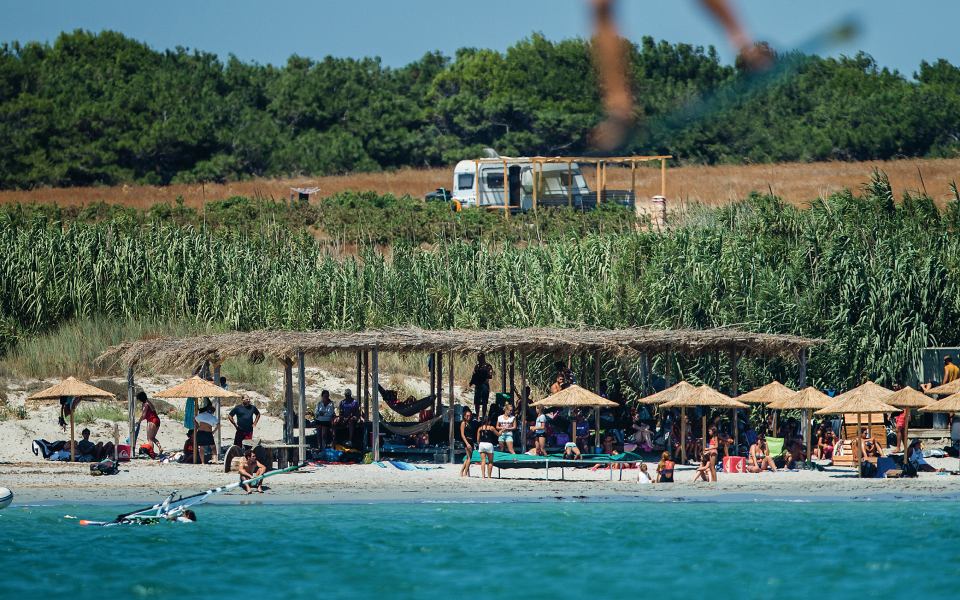
Keros Beach can accommodate both skillful surfers and those who simply want to swim in its cool waters.
© Surf club Keros
Your summer fairy tale is written here in neighborhoods with elegant old mansions, on sand dunes, on beaches for all tastes, and across untouched landscapes, grain fields and vineyards.
I first came for the wedding of two good friends, but stayed on for about ten days’ holiday.
The only thing I knew about Limnos beforehand was the taste of the local sweet wine and of kalathaki, the delicious, protected designation of origin goat and sheep’s milk cheese.
That, and the myth that the god Hephaistos had his workshop on the island and first bequeathed the craft of metalworking to the islanders.
The Limnos I got to know was full of surprises and notable peculiarities, which instantly placed it in my personal top 10 holiday destinations.
Rich fishing waters and fertile plains give way to vineyards and beautiful hamlets. The locals are discreet, polite and measured.
The place sparkles with cleanliness, and haphazard constructions – which blight many a holiday destination – are few and far between.
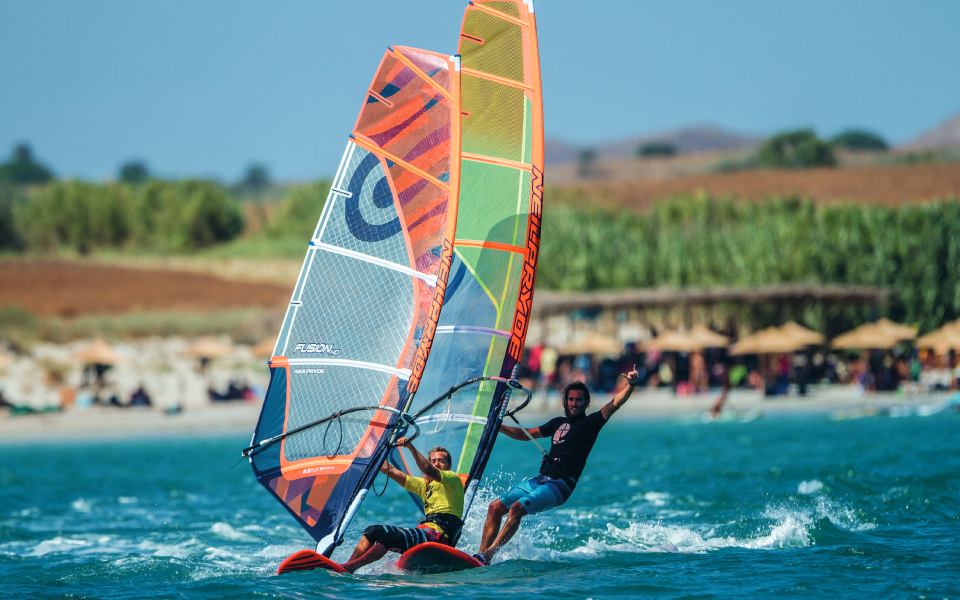
Keros Beach can accommodate both skillful surfers and those who simply want to swim in its cool waters.
© Surf club Keros
On entering the port of Aghios Nikolaos in Myrina, you cannot help but admire its castle. It is considered the largest fortification in the Aegean and is certainly one of the best preserved.
Large steps make for an easy ascent, while at night it is illuminated and resembles a golden crown over the town and the sea. If you climb to the top, you will see Myrina spread out below you like a fan.
From above you also will see that the capital’s beach is divided in two, known as the “Turkish beach” and the “Greek beach.” The latter is frequented by the deer that live in the fort.
I was not lucky enough to see them myself, but my friends were treated to the spectacle. Imagine, deer just a stone’s throw from the beach! The whole island is home to wildlife.
I saw wild rabbits hopping along a plateau just off the main highway, an eagle-owl standing in the middle of the road, and snow-white swans and speedy partridges near the Alyki lagoon, a Natura 2000 wetland reserve which plays host to pink flamingos until June.
In the villages of Roussopouli and Kontopouli we saw hawks and kestrels.
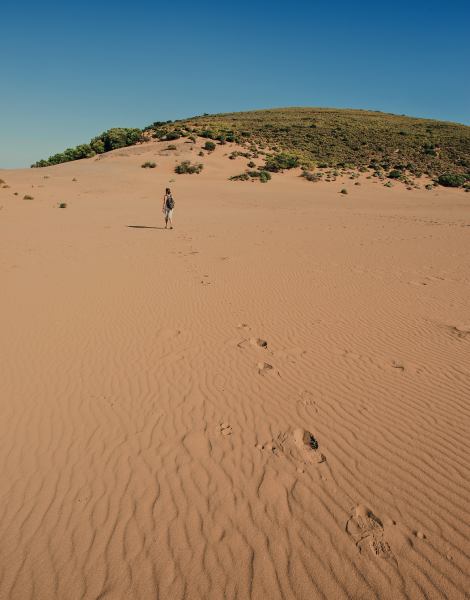
The island’s impressive dunes, an Aegean desert for endless games in the sand.
© AFP/Visualhellas.gr
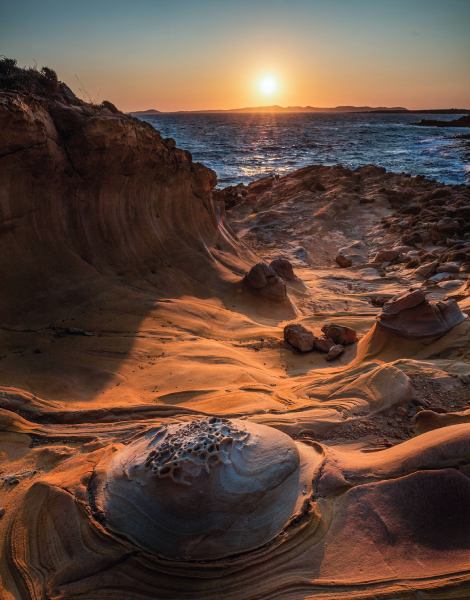
Volcanic rocks at Faraklo, a moonscape next to the sea.
© Visualhellas.gr
All of this can be found in the northeastern corner of the island, near the ancient theater of Hephaisteia and the Kavirio Sanctuary, two of its most important archaeological sites.
Here you will also find the Cave of Philoctetes, an impressive rocky opening in the sea, which you can reach either on foot or by sea (open daily except Tuesdays, 08:00-15:00) to swim in its calm, crystal waters.
At the island’s northeasternmost tip you can watch the most beautiful sunset from the isolated chapel of Aghios Haralambos, beyond the village of Plaka.
If you decide to drive there, you’ll need a long-sleeved top or jacket. The wind blows often and strong on the island – which is the reason Homer refers to it as Anemoessa, the windy island.
While you are at it, add a pair of sturdy walking shoes to your packing list. These proved to be our salvation when we visited Ammothines, the “Sahara of the Aegean,” close to the village of Katalakkos in the northwest.
Shifting brown sand dunes with sparse vegetation create a cinematic landscape fit for your own National Geographic documentary.
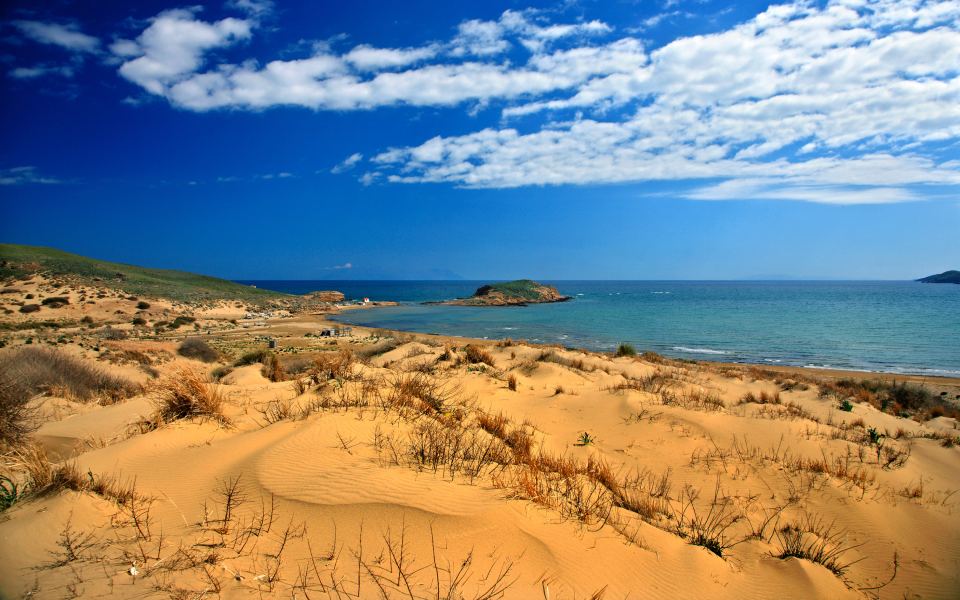
Gomati beach
© Shutterstock
We climbed, our shoes sinking in the sand, and descended rolling like barrels. To wash the sand off, we went for a swim at Gomati, a beach painted in earthy tones, with cool open waters.
You will rarely find yourself on a crowded beach on Limnos, and that is one of the island’s great advantages.
On July 31, at the height of the season, we found ourselves alone on beautiful pebble beaches with crystalline waters. And there’s a beach for everyone.
Those who like activities can visit Keros, home to one of the bestknown surf clubs in Greece. Half of the beach is kept free for swimmers and the rest is used for watersports.
At the end of the beach is a small chapel, and the next beach along is Ammolipsies, which is covered in seashells.
At Kokkinovrachos Beach we lay in hammocks drinking mojitos, while on a windy day in the Faraklo Geological Park, the smell of wild thyme tickled our nostrils.
The waves crashed on volcanic rock formations, and it felt as if Aeolus, the wind god, was spraying us with saltwater. At Moudros, the second largest town on the island, there are two beaches, Mikro and Megalo Fanaraki, which are safe options in all weathers, as they are reasonably well sheltered from the winds, especially if you go inside the Seal’s Cave.
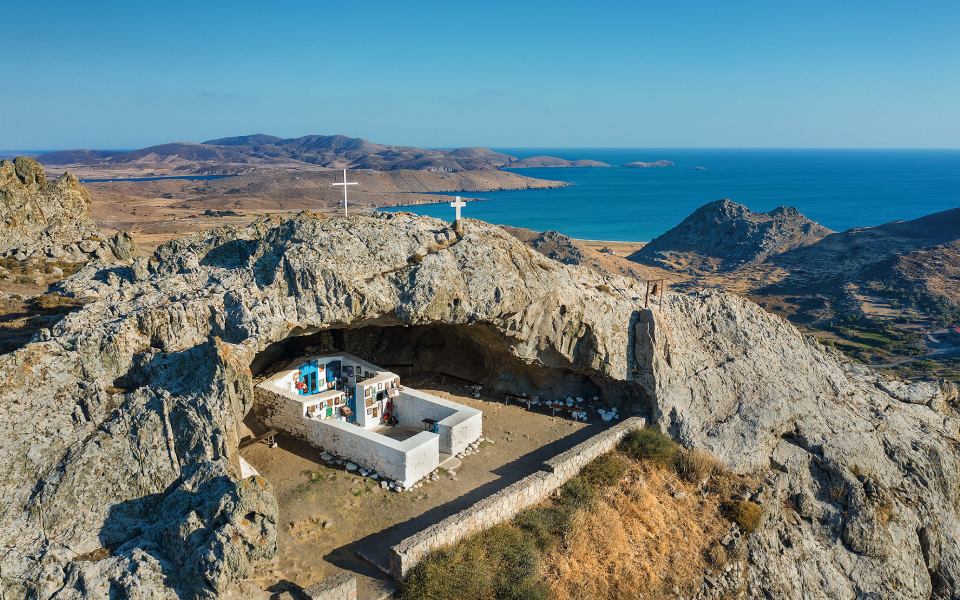
The roofless chapel of Panaghia Kakaviotissa in the southwest of the island.
© Visualhellas.gr
Ramblers will love a morning walk to Panaghia Kakaviotissa, a roofless chapel built inside a cave on Kakavos mountain.
The ascent takes about half an hour, and the view is amazing. Don’t forget to take plenty of cold water, and a camera to photograph the wild goats which rest in the shade of the rock.
Near here you will find Kontias, a beautiful village with derelict windmills, a historical home of seafarers.
Kyria Kaity at the San Allote taverna is famous for her meatballs. Visitors will eat well on the island, as local producers supply tavernas with dairy products, pasta, wine, flour and meat, and some of them are real gastronomic marvels.
Ennia Po’chs in Lychna, a taverna-café with a casual atmosphere and experimental tendencies, is well worth a visit.
In the village of Sardes, you can taste rooster with flomaria (a local handmade egg pasta) in the famous Man-Tella taverna, while in Myrina the brand-new Riza gastro-café at Androni offers, in a simple setting, unadulterated flavors courtesy of the island’s best products.
We had the perfect breakfast at Pezoula, and all-day hangout serving lalangites – the local donuts served either with honey or in a savory version with local feta cheese and oregano.
Here you can also try kaplamas, the Limnian croque madame, with melichloro cheese on traditional village bread with a fried egg.
If you are in search of bigger adventures and have access to a sturdy car, you can drive to the Fakos peninsula, an ideal destination for nature lovers, which you reach through Diapori, a small fishing village with repair docks, which is almost always deserted.
Discover festivals, beaches, food, and hidden...
When the summer crowds depart, Greece’s...
A compact archaeological guide to the...
Shady hiking trails, a vibrant cultural...